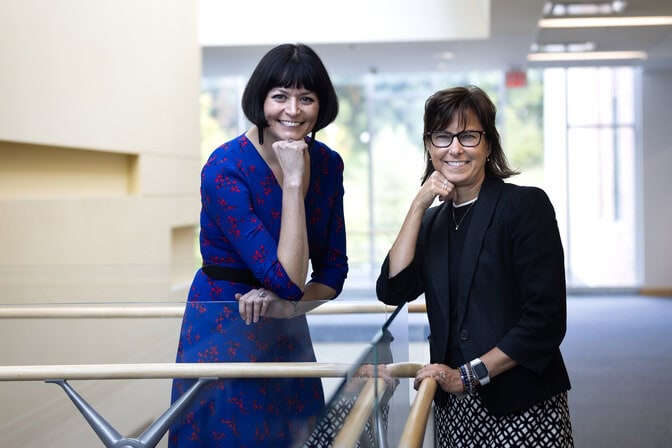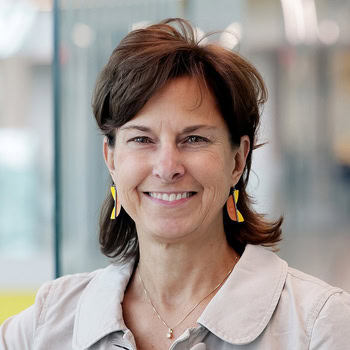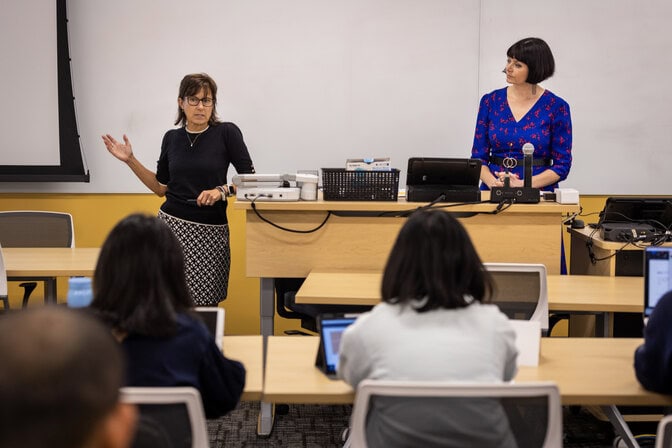
Educating People-First Engineers: A Q&A with Cindy Finelli and Erin Cech
Preparing the next generation of engineers to consider public welfare when developing new technologies.

Preparing the next generation of engineers to consider public welfare when developing new technologies.
Experts

David C. Munson, Jr. Professor of Engineering
Professor of Electrical and Computer Engineering
Medical and law students bookend their education with an oath—accepting the privileges and responsibilities of the profession—and rigorous board exams.
Engineers who choose to join the National Society of Professional Engineers recite the Engineers’ Creed, pledging to work towards the “advancement and betterment of public health, safety and welfare.” However, there is no universally accepted code of ethics for practicing engineers and no widespread way to hold engineers in the workforce accountable if they act unethically. Yet engineers carry a tremendous professional responsibility—developing technology that impacts society at large in communication, transportation, energy, healthcare and more.
Striving to be part of the solution, the University of Michigan College of Engineering developed a people-first engineering framework that guides educators, researchers and practicing engineers to do their work in a way that closes critical gaps and elevates all people. The framework requires three things: excellent engineering fundamentals, convergence of disciplines and equity-centered values and global world views.
In this Q&A, Cynthia Finelli, the David C. Munson, Jr. Professor of Engineering, a professor of electrical and computer engineering and education by courtesy, and the director for engineering education research, and Erin Cech, an associate professor of sociology and mechanical engineering by courtesy, share their research on effective public welfare responsibility training for engineers and discuss their new teaching partnership. Exhibiting all three tenants of the people-first engineering framework, this endeavor works to incorporate equity-centered values in undergraduate engineering education.
Finelli and Cech’s curriculum prepares students to recognize and respond to issues in the workplace, covering topics like what it means to whistle blow and how to write an op-ed. The standalone course (EECS 498-701/ME 499-70: Public welfare responsibilities in engineering) was taught for the first time this semester with plans to eventually integrate the content into other required engineering courses.
Cech: Engineers are the professionals that, culturally and socially, society has given the power to create objects and systems for people to use. As a result, we hold engineering professionals to expectations and standards of practice in the same way that we hold lawyers and doctors to certain expectations.
For engineers this is true not only in terms of whether the things they produce are efficient and functioning, but these standards take into account the potential implications of the technologies and systems they produce.
This includes thinking about things like conflicts of interest within the organization they work for, and the welfare of the public that will be exposed to the objects or systems. Public welfare includes health and safety, but also people’s access to opportunities and ways to live their lives the way they choose.
We can’t think about engineers’ products and practices without considering the implications in those broader spaces.
Finelli: Practicing engineers and faculty often hold the mindset that engineers need to be technical designers, they need to know the underlying math and science pieces of what they do, but that they shouldn’t have to worry about the public. It’s hard to argue that you shouldn’t have to be mindful of the public, but for some reason people just don’t often connect those pieces.
Cech: It’s not that they necessarily devalue those things personally, or would want to inflict harm intentionally. When they think about their roles day to day, those considerations don’t seem relevant or seem far less relevant than the tactical specifications of their work.
Part of the reason that it is so vital for engineers to consider public welfare now is that people are living with many technical objects and systems without a full understanding of how they might be impacting their lives. Engineers are often the only group of people with the knowledge base to ask these kinds of questions.

Finelli: I think facial recognition technology and AI are really in the forefront of people’s minds right now. When we brainstormed this in class at the beginning of the semester, AI concerns came up time and time again. Where do we draw the line? What is ok? What is not ok?
Another pressing area is the disconnect between the products engineers are designing and how they are used. For example, designing software for one purpose that is co-opted by others in some weaponizing way.
From an engineer’s perspective, advocating for more transparency about the intended use of the technology they are designing is an important concept our engineering students are grappling with.
Finelli: Current students say they don’t feel prepared. Our new course isn’t the answer for everything, but the students seem to really want to get more expertise or skill to address the issues that arise when they enter the workforce.
Cech: In our recent research, we used a nationally representative sample of engineers working in the United States to compare the effectiveness of public welfare responsibility training received in various contexts like engineering courses, workplaces or professional societies. We found that training in formal engineering courses was the only context that had a robust connection to the way engineers understood their responsibilities as employed engineers.
Even so, we also found that only about a third of employed engineers are getting that kind of training in their undergraduate engineering programs. That’s two-thirds of the engineering workforce that doesn’t have this kind of training, which is pretty staggering.
Cech: The culture within engineering education emphasizes to students early on that there are technical classes, which present the most valued type of information portrayed to them, and there are other classes, which are considered less valuable.
When you can have conversations about public welfare responsibilities incorporated into the courses that are part of their major, that sends a powerful signal that this matters to your performance in the workforce.
There’s some training on the job, but there’s a lot of countervailing pressures or expectations for companies to not offer training that would lead the engineers in their company to question the work that’s being done. As for professional societies, many people are not part of them or choose not to have training in that space.
Finelli: When I taught about conflict minerals as they related to capacitors and the circular economy as related to the voltage divider principle in a circuits class, some students were very interested and engaged while others specifically expressed that this is not the place to learn about this. They felt we should only learn the technical stuff.
The students that might be more motivated by social engagement or public welfare rarely get to see that content. I think it’s our duty as instructors to bring this content into our classes to interest those students.
From faculty, we anticipate lack of familiarity with the content and feeling like they can’t take time out of content-heavy technical courses. There’s the tension of faculty thinking they can’t focus on the societal impacts or the public welfare considerations because the technical stuff is more important.
I think by and large, faculty are open and willing to introduce these ideas, but they just don’t know how to do it.
Cech: In our study, 17% of engineers reported encountering an ethical concern in their job to the point that it made them think about leaving their job. This is not something that is out of the ordinary by any means. By sanitizing the technical content from ethical considerations, we’re doing an injustice to the students by not training them to handle those things when they enter the workforce. But the fact that students potentially push back is another reason that faculty would be hesitant to bring public welfare considerations into their courses, so it’s important to address both.
Cech: I went into electrical engineering as an undergrad. My grandmother was blind, and I was really interested in assistive technology. I came into this topic with an understanding that questions of access and equity were firmly bound up in the work that engineers did. When I got to my undergraduate education, I found that there was no space in my classes for that topic. In fact, my classmates and professors thought I was strange for even asking those questions. They were seen as completely inappropriate in the context of my circuits classes or my electronics classes.
I sought out other spaces to think about those things, and that led me to sociology to develop the tools and methodologies for thinking about these things more seriously. For a long time I’ve been really concerned about not only these topics more broadly, but the limitations and the hesitancy within engineering to think about them seriously.
Finelli: My story is totally different. I have three degrees from the University of Michigan in electrical engineering. I marched through the curriculum like a traditional electrical engineer.
I went off to a private teaching-focused school and collaborated with some colleagues as we were troubled by the high rates of cheating. We naively started with a study to learn more about why engineering students cheat and how to stop them from cheating.
We found some important things in our work, but more so we realized that we were asking the wrong questions. We should have been asking: how can we help students develop more ethical mindsets? What can we do in the curriculum to better support students in their ethical thinking, development and behavior? That experience started me down this path.
Cech: With our mutual interest in engineering education, we were swimming in similar enough circles that we thought, why are we not working on a project together? This makes sense.
Finelli and Cech thank Musabbiha Zaheer, a third year undergraduate student at U-M majoring in computer engineering, for her insight when designing this course.
Cech and Finelli’s research is supported by the US National Science Foundation (Grant number 2053046).